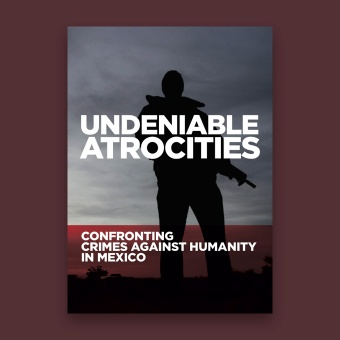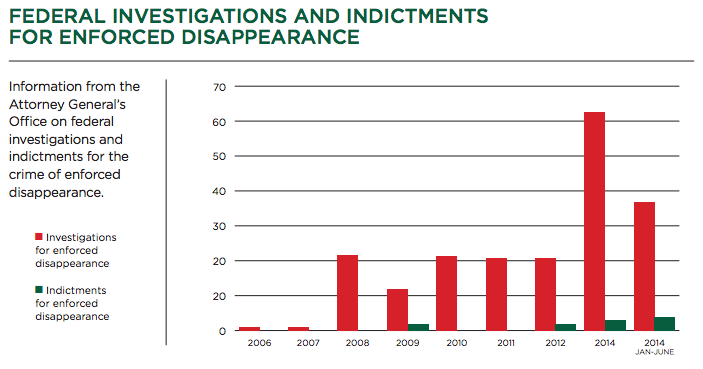
10/03/16 (written by kheinle) — A report released by the Open Society Justice Initiative in June 2016 provides a scathing overview of crimes against humanity being committed in Mexico. The report, Undeniable Atrocities: Confronting Crimes Against Humanity in Mexico, finds that not only have crimes against humanity occurred, but also that those responsible, namely the Mexican government and the Zetas criminal organization, have not been held accountable. This argument is largely built on the legal standards outlined in the Rome Statute of the International Criminal Court, to which Mexico has been privy to since 2005. As Robert Varenik, Acting Executive Director of Open Society Justice Initiative, synthesized in a communication,
“Based on three years of research and over 100 interviews, the [Undeniable Atrocities] report examines the devastating toll of drug-related violence in Mexico and finds a reasonable basis to believe that federal security forces and members of criminal cartels have, since 2006, perpetrated killings, enforced disappearances, and torture on a widespread and systematic scale such that they constitute crimes against humanity.”
To arrive at the conclusion, the report begins with homicides. Only 10% of homicide cases that occurred between 2007 and 2012 resulted in convictions, the report reads, and only 16% of homicide investigations opened by federal prosecutors from 2009 through July 2015 led to indictments. The data proves worse for disappearances, whether criminal or enforced (perpetrated by state actors/law enforcement). As of February 2015, only 13 convictions resulted from 313 federal investigations into enforced disappearances, and not until August 2015 was a single soldier ever convicted for his or her involvement in cases of disappearances despite evidence proving otherwise. Meanwhile, 12 indictments and eight judgments were issued in 1,884 federal investigations into torture between 2006 and 2014, and cases of torture resulted in only six convictions between 2007 and April 2015.
Taking these findings into consideration vis-à-vis Mexico’s obligation to the standards set forth in the Rome Statute, the “analysis finds that the situation in Mexico meets the legal definition of crimes against humanity.” The report also considers Mexico’s responsibility as a state to protect its people, arguing that the government’s ability to do so has been undermined by its own legitimate strategy launched in 2007 by then President Felipe Calderón (2006-2012) against organized crime. Undeniable Atrocities writes that the strategy “deployed the military and federal police [to the streets] to use overwhelming extrajudicial force against civilian populations perceived to be associated with criminal cartels, without adequate regulations on the use of force, and with almost no accountability for any of the abuses that followed.” Not only has this strategy led to an increase in human rights violations without proper oversight of the deployed military and police, but it also has hindered the Mexican government’s ability to protect its people. This can be considered ironic given the strategy’s ultimate goal was to increase the country’s safety and security by eliminating organized crime.
The government’s role in human rights violations discussed in Undeniable Atrocities (homicide, enforced disappearance, and torture) has long been a focus of national and international concern. Mexico’s National Human Rights Commission (Comisión Nacional de los Derechos Humanos, CNDH) is a reputable, independent source that documents these violations by state actors, as found in their public Recommendations (Recomendaciones) that detail credible accusations of violations and recommendations for how to mitigate and rectify the situation.

In 2016 alone, five such CNDH recommendations have been issued to the Secretary of National Defense (Secretaría de la Defensa Nacional, SEDENA) and an additional five to the Secretary of the Navy (Secretaría de Marina). The rate of recommendations issued against SEDENA (five recommendations over nine months for a .56 rate of recommendations/month) is significantly less than what Justice in Mexico documented in its 2012 report, “Armed with Impunity: Curbing Military Human Rights Abuses in Mexico.” Data used in that report shows that over a 62-month span under President Calderón dating May 2007 through July 2012, 101 recommendations were issued against SEDENA at a rate of 1.62 per month, thus nearly tripling SEDENA’s current rate. On the other hand, SEMAR’s rate of recommendations in 2016 (.56) is significantly higher than its rate under Calderón, when only 17 recommendations were issued during the same 62-month span (.27 recommendations/month).
Both military entities were recently issued recommendations from CNDH documenting human rights abuses, thus falling in line with the Undeniable Atrocities report. In August 2016, for example, CNDH’s “Recomendación No. 42/2016” detailed SEDENA’s role in a case in Tecpan de Galeana, Guerrero in 2012 that involved illegal search, arbitrary detention, and arbitrary execution of two minors and four adults. Two weeks later, CNDH issued a recommendation against SEMAR (Recomendación No. 43/2016) about a 2013 case in San Luis Potosí that involved violations of seven victims’ rights to liberty, personal security, personal integrity, and access to justice, as well as the torture of one of the victims.
The role of authorities in violating human rights and committing crimes against humanity, as Undeniable Atrocities argues, thus continues to be a pressing and present issue in Mexico. According to Jorge Castañeda, Mexico’s former foreign minister (2000-2003), the Open Society Justice Initiative’s report is “the most crushing critique to date of the war against drugs waged by [Presidents] Calderón and Peña Nieto since the end of 2007.” Respected and well-known Mexican journalist Carmen Aristegui also weighed in after reading the report, declaring that a “big debate” should be initiated in Mexico to address the crimes against humanity and hold those responsible accountable. The Undeniable Atrocities report builds on that comment with its recommendation. “The government must act without delay,” it reads, “to acknowledge the gravity of the situation: it must initiate urgent, extraordinary measures, including the invitation of international assistance to ensure independent, genuine investigations and prosecutions.” It will be interesting to see how the Peña Nieto administration addresses such calls for action during its final two years in office.
Sources:
“Undeniable Atrocities: Reactions.” Open Society Foundations. June 2016.
Recomendación No. 42/2016. Comisión Nacional de los Derechos Humanos. August 31, 2016.
Recomendación No. 43/2016. Comisión Nacional de los Derechos Humanos. September 14, 2016.
Email communication. Varenik, Robert O. via Jillian Winkler. Open Society Justice Initiatives and Open Society Foundations. September 21, 2016.
Web. “Recomendaciones.” Comisión Nacional de los Derechos Humanos. Last accessed October 1, 2016.




